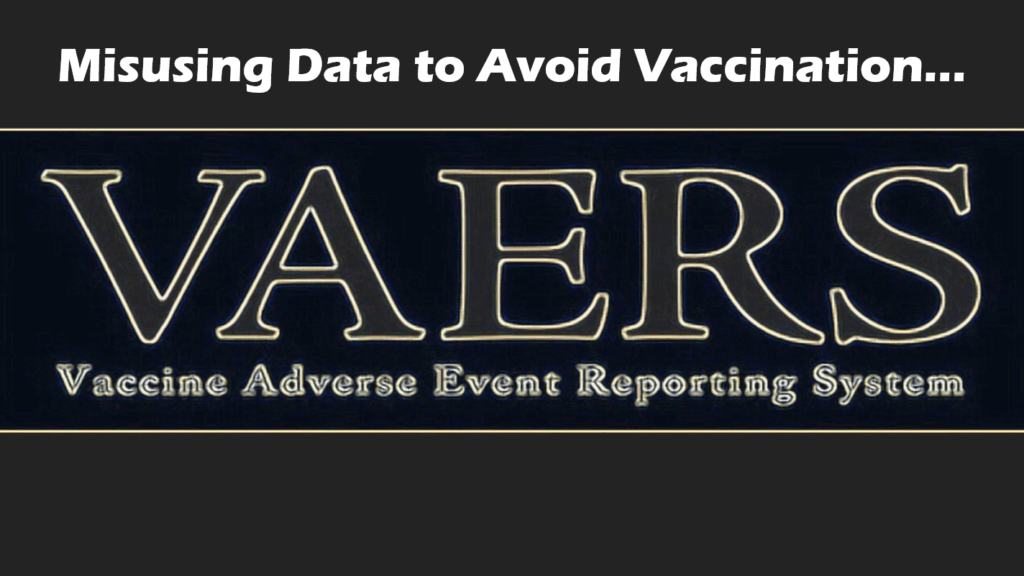Those Opposed to COVID Vaccination Have a Causation Problem

One of the rationales now being given by many on the Internet is that since lots of complications and other things are being reported in an FDA vaccine adverse event reporting system, that this means that the two existing COVID vaccines are unsafe. To understand why that’s just noise, let’s learn a little about how medical causation is determined.
The VAERS System
The Vaccine Adverse Event Reporting System (VAERS) is an existing post-market reporting system for vaccine side effects sponsored by HHS. It’s also been featured in many blogs and news stories by people in the natural health industry who oppose vaccination in general and in particular, the two new COVID vaccines. So what is VAERS?
VAERS is where doctors and patients can report if they believe that they have had a side effect from a vaccine. Anyone can access this data. What’s in the system related to the COVID-19 vaccines? A bit of everything from allergic reactions to people who died within some proximity to having the vaccine.
Misusing the VAERS Data
Picking out the worst side effects that can be found in the VAERS system has become a sport for those natural health devotees who oppose the vaccine. However, there’s a big problem that all of these bloggers and newsletter authors don’t understand. It’s called causation. By learning about this concept, we’ll learn how a physician determines if a disease is related to a medication or procedure, or event (like a car crash).
Causation 101
Causation is whether disease A is related to event B. This is figured out by an analysis of these three factors:
- Temporal Association? Did the side effect or complication occur right after the intervention or at an appropriate time for the disease or complication? For example, an infection beginning months after surgery makes little sense.
- Biologic Plausibility? Was the complication related to the intervention in a biologically plausible way? Meaning could the medication or procedure have caused this particular side effect? For example, a surgery that caused a permanent allergy is very unlikely.
- Lack of a Likely Alternative Explanations? Is there something else that better explains the complication other than the intervention? Consider a patient who gets injured in a car crash that causes no symptoms, but falls the next week and breaks a neck bone. The second event is more likely the cause of chronic neck pain.
All three of these need to be positive if we’re going to say that drug A is related to reported side effect B.
Causation, VAERS, and Expected Deaths
Every week in the United States, without COVID, some 50-60,000 people are expected to die. Right now, we have vaccinated around 24% of the US population, most of those the elderly who would be the most likely to die in any given week. So if we look at 24% of the US population that is mostly older, we would expect at least thousands to die each week if a vaccine didn’t exist. This shows us why reporting deaths or serious diseases out of VAERS is so silly as none of it has any meaning without a causation analysis for each and every report.
A hard one for alternative health types to accept is that otherwise perfectly healthy people die each week. This goes against the grain of the natural health sales pitch that you can prevent or cheat death if you eat right, exercise, and take your supplements. While it’s true that you can likely reduce your risk of death by doing these things, people that do all of these things still randomly die. Hence, when we see someone who dies a few weeks after getting a vaccine who looks otherwise healthy, again, we still need to determine causation in that case, as seemingly young and healthy people also drop dead from time to time.
The upshot? Non-medical people who don’t have the medical school and specialist training to adjudicate each and every reported VAERS complication should not be claiming that the data in this system shows much of anything, other than events that would have happened if the vaccines didn’t exist. So get vaccinated and lets’ end this awful pandemic!

If you have questions or comments about this blog post, please email us at [email protected]
NOTE: This blog post provides general information to help the reader better understand regenerative medicine, musculoskeletal health, and related subjects. All content provided in this blog, website, or any linked materials, including text, graphics, images, patient profiles, outcomes, and information, are not intended and should not be considered or used as a substitute for medical advice, diagnosis, or treatment. Please always consult with a professional and certified healthcare provider to discuss if a treatment is right for you.
